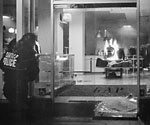Mayor Paul Schell put a happy face on the threat of violent demonstrations at the World Trade Organization meetings, famously urging Seattleites to come downtown and shop. At the same time, documents now show, repairs were being made to his own City Hall penthouse office door so it could be properly locked, 12 stories up, to keep WTO-related intruders at bay.
According to an 80-page WTO security plan for city buildings, drafted by the mayor’s Executive Services Department months before the conference, city officials also sought new lighting, security cameras, and phone lines for City Hall. They tack-welded nearby utility hole covers and added air-filter system protections and shatter-proof window coverings as well.
Behind the scenes, at least, the city was seriously worried its headquarters bunker and other areas of downtown could be penetrated by WTO demonstrators.
The mayor’s office also knew at least a month before the conference began that federal officials were so concerned about protester street violence they wanted to undertake radical defensive measures.
According to a copy of an October 26 “WTO update” e-mail message to city officials from the mayor’s office, the US Secret Service wanted to totally close down the main demonstration corridor—Pike Street—and had conjured up a plan to “drape” the WTO Convention Center site in some kind of a massive protective covering.
That kooky plan was scotched during private planning sessions, according to the memo, because the media might have viewed a blanketed center as a way “to show how secret the WTO really is.”
These are among the revelations in reams of city, county, and federal documents now being reviewed by the City Council in its months-long effort to determine why the November 30-December 4 global ministerial conference broke down in widespread civil and police disorder.
The documents also confirm the mayor and federal officials were aware of a firebomb attack by anarchists a month earlier, Halloween, on the downtown Seattle Gap store.
Windows were smashed and four Molotov cocktails thrown inside, setting afire a mannequin and interior areas. The Fourth Avenue at Pine Street store suffered $7,000 in damages.
In a letter five days later to US Representative Jim McDermott, Schell called that one of “two WTO-related assaults this past week” (the other incident was not identified).
The firebombing arguably foreshadowed the WTO violence that followed. According to earlier press accounts, federal intelligence sources cited the Gap incident as another sign the threat of violence was rising steeply.
There’s no indication how seriously Schell took the firebombing as a warning. But as history has since painfully recorded, when the tear gas cleared, more than 600 demonstrators had been arrested, shattered businesses were claiming millions in lost sales and damages, and the city was stuck with an overtime and expense tab now nudging $10 million.
Contrasting City Hall’s security reinforcements with the mayor’s calming proclamations, it could appear Schell was asking the public to do as he said, not as he was doing. That could add another question—prudent precautions or hypocrisy?—to the list already facing council reviewers.
The council’s focus appears to be primarily on what the mayor and police chief knew about violent threats and whether or not they intentionally disregarded them.
Schell’s press spokesperson Dick Lilly says the mayor, for now, won’t comment on his planning motives. “Mayor Schell is not going to comment on those kinds of things while the reviews are under way,” Lilly says.
Though Schell has accepted blame and Police Chief Norm Stamper has announced his retirement, an unsigned post-WTO assessment paper contained in the mayor’s office files may give a hint to Schell’s current alibi.
The paper shifts at least some responsibility for the breakdowns from the city to the feds, noting “the volume of protesters committed to determined, unlawful civil disobedience was unprecedented and unanticipated in the Threat Assessment prepared by the FBI.”
Neither the FBI nor Seattle Police will release a copy of the assessment. The SPD’s Carmen Best says WTO documents are part of “an ongoing investigation”— an in-house review—and therefore exempt from disclosure.
A Seattle Weekly review of the planning papers contained in several boxes in the mayor’s office shows Schell and other officials were quietly preparing for the worst all along. It can be argued this was standard operating procedure for such a large event; but did the immense precautions impress upon Schell the dangers the city was facing?
An October letter from Schell to state National Guard Major General Tim Lowenberg sought, for example, 10 fire task forces (three engines, one ladder, and one on-command unit each) with a two-hour call-up capability for “major incidents,” five HumVee ambulances with medics, a team capable of mass decontamination and field treatment of chemically or biologically contaminated patients, epidemiologists and a team capable of providing advanced mass-casualty life support, a unit capable of extraction of victims from a “hot zone” chemical attack, a mass casualty drug cache for up to 5,000 patients who might need treatment, and urban search and rescue teams capable of heavy rescue of “entombed” patients from sites of bombings.
Other documents show that city and federal officials planned months ahead for the possibility of massive lawbreaking and “the event of mass arrests” by establishing a systematic procedure to book hundreds of demonstrators.
In contrast, at the time Schell was indicating he had no intention of turning Seattle into Chicago, 1968, when Mayor Richard Daley sent police out to crack the heads of Democratic convention rioters, or allowing Seattle to become a New York City ruled under the heavy hand of Rudy Giuliani. “I’m no Mayor Daley, and I’m no Mayor Giuliani,” Schell told reporters. “I’m confident we will not overreact.”
Awaiting the council’s critique, Schell’s office cautions against viewing the mayor’s actions narrowly. “These [questions] come under the heading of stuff we expect to come out of reviews,” says spokesperson Lilly, “which is best, because they should come out in the largest context possible.”








